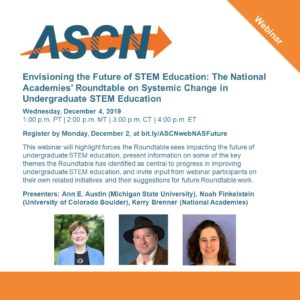Envisioning the Future of STEM Education: The National Academies’ Roundtable on Systemic Change in Undergraduate STEM Education
Wednesday, December 4, 2019
1:00 pm PT | 2:00 pm MT | 3:00 pm CT | 4:00 pm ET
Presenters: Ann E. Austin (Michigan State University), Noah Finkelstein (University of Colorado Boulder), Kerry Brenner (National Academies)
The Roundtable on Systemic Change in Undergraduate STEM Education is a group of the National Academies of Sciences, Engineering, and Medicine that brings together national experts and thought leaders representing the full spectrum of stakeholders in higher education. They coordinate and catalyze actions that advance the common goal of improving undergraduate STEM learning experiences. Linking existing reform efforts in science, technology, engineering, and mathematics (STEM) education allows reformers to learn from each other and leverage each other’s work. Using evidence-based approaches and building on successful reform efforts, the roundtable works to expand access, increase equity, and support quality learning experiences for all learners. Their work examines changes in technology, workforce, demographics, and society to determine optimal ways for the system of higher education to respond to the current and future needs of the nation to have a scientifically literate public and a well-prepared STEM workforce. This webinar will highlight forces the Roundtable sees impacting the future of undergraduate STEM education, present information on some of the key themes the Roundtable has identified as central to progress in improving undergraduate STEM education, and invite input from webinar participants on their own related initiatives and their suggestions for future Roundtable work.
This webinar is designed for individuals involved in STEM education reform initiatives or who are interested in change efforts and avenues for connecting to a national agenda. We welcome current faculty as well as future STEM faculty; academic and administrative leaders at 2- and 4-year colleges and universities; and leaders and staff of non-profit organizations, professional societies and disciplinary associations, and funding organizations.
